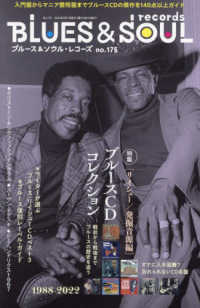- ホーム
- > 洋書
- > 英文書
- > Politics / International Relations
Full Description
In the aftermath of the Liberian civil war, groups of ex-combatants seized control of natural resource enclaves in the rubber, diamond, and timber sectors. With some of them threatening a return to war, these groups were widely viewed as the most significant threats to Liberia's hard-won peace. Building on fieldwork and socio-historical analysis, this book shows how extralegal groups are driven to provide basic governance goods in their bid to create a stable commercial environment. This is a story about how their livelihood strategies merged with the opportunities of Liberia's post-war political economy. But it is also a context-specific story that is rooted in the country's geography, its history of state-making, and its social and political practices. This volume demonstrates that extralegal groups do not emerge in a vacuum.
In areas of limited statehood, where the state is weak and political authority is contested, where rule of law is corrupted and government distrust runs deep, extralegal groups can provide order and dispute resolution, forming the basic kernel of the state. This logic counters the prevailing 'spoiler' narrative, forcing us to reimagine non-state actors and recast their roles as incidental statebuilders in the evolutionary process of state-making. This leads to a broader argument: it is trade, rather than war, that drives contemporary statebuilding. Along the way, this book poses some uncomfortable questions about what it means to be legitimately governed, whether our trust in states is ultimately misplaced, whether entrenched corruption is the most likely post-conflict outcome, and whether our expectations of international peacebuilding and statebuilding are ultimately self-defeating.
Contents
Introduction
Part I. Extralegal Groups
1: How to Study Extralegal Groups
2: Theoretical Framework
Part II. How Context Matters
3: History and Society
4: Civil War
Part III. Economic Sectors
5: Rubber
6: Diamonds
7: Timber
Part IV. Trade Makes the State
8: Conclusion: Extralegal Groups are Statebuilders
9: Research Design Scaffolding
Appendix A. Statistics on Killings
-

- 電子書籍
- 出てきてください、ロミオ【タテヨミ】第…
-

- 電子書籍
- 純喫茶ねこ (8) バーズコミックス





